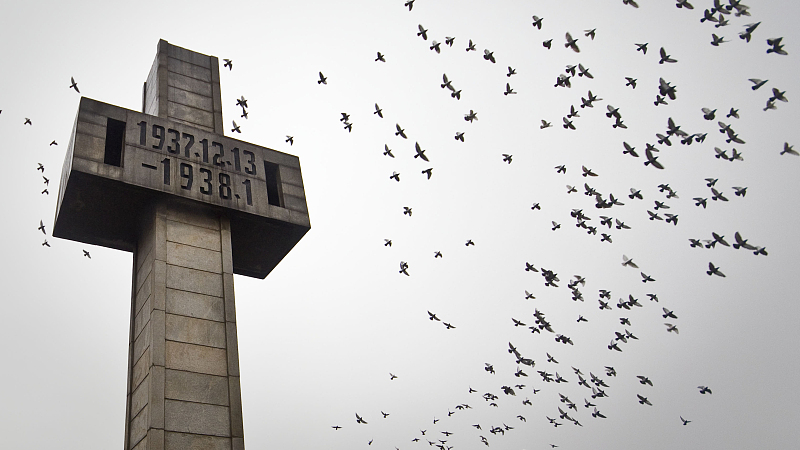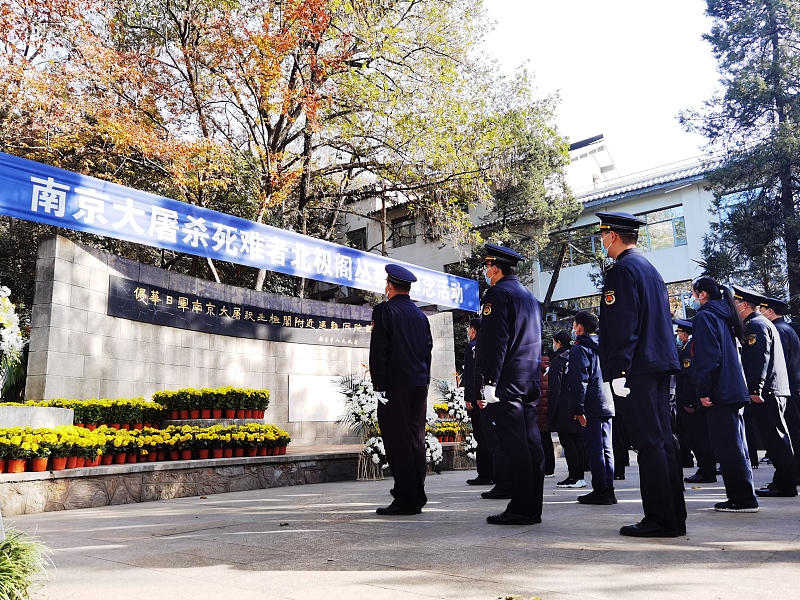
The monument of the Victims of the Nanjing Massacre by Japanese Invaders in Nanjing. /CFP
The monument of the Victims of the Nanjing Massacre by Japanese Invaders in Nanjing. /CFP
Editor's note: Sun Wenzhu is an associate research fellow of the China Institute of International Studies. The article reflects the author's opinions and not necessarily the views of CGTN.
On December 13th, 1937, Nanjing, the capital of the Republic of China at that time, fell to the control of the Imperial Japanese Army after a short siege. During the following 6 weeks, Japanese invaders committed one of the most heinous atrocities not only during the World War II, but also in the history of humankind.
With orders from high-level commanders to "take no prisoners" and to "mop-up Nanjing after the capture," Japanese troops indulged themselves into frenzied and indiscriminate mass killings of innocent Chinese captives and civilians, including women, children and the elders.
They summarily executed tens of thousands of Chinese surrendered soldiers with automatic weapons, slaughtered civilians by the cruelest means, arbitrarily intruded houses to rape women and girls, loot and set fires. As one of the most abominable parts, some military officers took on "killing contests," competing with each other on the numbers of Chinese people they killed with their swords as an entertainment.
Numerous bodies of the victims were destroyed by the Japanese perpetrators through burning, mass burying or even throwing directly into the Yangtze River, in order to cover up their crime. According to the investigation of the Nanjing War Crimes Tribunal in 1946, more than 300,000 Chinese people were killed by the Japanese troops in 886 slaughter cases of various sizes during the Nanjing Massacre. One-third of the buildings in Nanjing were burnt down.
As one of the darkest episodes of the history in Asia, the Nanjing Massacre is doubtlessly a timeless reminder for the real value of peace. The traumatic literal and photo records of the devilries that happened in Nanjing is just unignorable for everyone with consciousness, and thoroughly illustrates how peace is a basic necessity, like water and air, for the daily life of common people.
Without peace, there could be no room for humanity. The post-war Constitution of Japan formally outlawed war as a means to settle international disputes involving the state in its Article 9, stating that armed forces with war potential will not be maintained, which makes Japan a "pacifist country."
Yet as time goes by, the historical cognition in Japan goes deformed as the right-wing nationalists make every effort to deny the responsibility for invading and colonizing its neighbors, and for causing humanitarian disasters throughout Asia.
As the right-wing nationalists advocate the "glory and greatness" of the Imperial Japan, linking these to a goal of "relieving Japan out of the post-war era" and "rejuvenating as a great power," lines between merit and crime, justice and injustice, are intentionally blurred.
With high-level government officials and political leaders, even Japanese prime ministers frequently visiting the Yasukuni Shrine, where convicted war criminals including Iwane Matsui, the one who headed the Japanese troops in the Nanjing Massacre and sentenced to death for that reason, were enshrined, the "deep self-reproach" and "keen consciousness for the responsibility" for Japan's offence and violence become nothing but ridiculous rhetoric.

People hold commemorative activities at the Memorial for the Victims of the Nanjing Massacre by Japanese Invaders, December 13, 2022. /CFP
People hold commemorative activities at the Memorial for the Victims of the Nanjing Massacre by Japanese Invaders, December 13, 2022. /CFP
Moreover, the widespread ignorance and detachment in most Japanese people born post war about that dark part of history, cultivated by a systemic understating of relevant issues in the whole process of Japanese public education, have hollowed out the essence of Japan being a pacifist country.
In Japan, pacifism gradually became a "politically right" ideology that somehow makes Japan unique and superior among others, thus could be exploited as a cover up for Japan to enhance its military strength, expand the range of military actions, and reelevate the role of military sector in national strategy, while depicting the rise of China as a "threat."
Even the pacifist constitution, the fundamental border between the post-war Japan and Imperial Japan, is under repeated challenge. All these negative trends erode the foundation of China-Japan relations, causing turbulences in recent years.
To look back at the Nanjing Massacre after 85 years, one should find that real lasting peace is indispensable to the prosperity and development of the world, and to the well-being of people from all countries, including China and Japan. Yet real peace must be based on trust and reconciliation, and may only last at the premise of justice.
Endured the miseries of WWII and raised up from them, China will always play a constructive role in safeguarding world peace and regional stability, and keep dedicated to promoting a human community with a shared future. Japan should face up to history and make active efforts to improve China-Japan relations and build a peaceful and stable community of shared future.
(If you want to contribute and have specific expertise, please contact us at opinions@cgtn.com. Follow @thouse_opinions on Twitter to discover the latest commentaries on CGTN Opinion Section.)